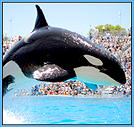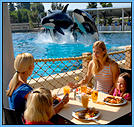
SEA WORLD
SAN DIEGO


Hubbs-SeaWorld Research Institute is a
public, non-profit organization dedicated to
providing solutions to
conflicts that arise between human activity and the natural world.
Research at the Institute,
which was founded in 1963, focuses on rare, endangered and
threatened species and
habitats, depleted fishery resources and on the ecology of marine
animals and biological
diversity. Access to SeaWorld's extensive marine zoological
collection and superb
facilities are unique assets that provide the Institute with
unparalleled
opportunities for scientific studies.
For more information, visit www.hswri.org.
The SeaWorld Animal Rescue and
Rehabilitation Program is an important part of the
park’s commitment to
conservation, research and education. SeaWorld’s mammal, bird and
fish specialists have
rescued, treated, rehabilitated and released thousands of animals that
were ill, injured or
stranded. On average, 65 to 70 percent of the animals rescued annually
are rehabilitated and
returned to the wild. In 2011, SeaWorld rescued 66 marine mammals:
40 California sea lions, 21
seals and five dolphins.
The SeaWorld & Busch Gardens
Conservation Fund is a private, non-profit charitable
foundation that allows
visitors to the 10 SeaWorld Parks & Entertainment properties, as well
as members of the general
public, to help protect wildlife. The Fund directs 100 percent of
donations to on-the-ground
wildlife conservation. Contributions strengthen the parks’
existing efforts to preserve
endangered wildlife; expand conservation education around the
globe; support worthy
conservation organizations; and to aid ill, orphaned, injured or
stranded animals. Since its
creation in 2003, the Fund has granted more than $8 million to
protect wildlife and wild
places, benefitting animals on land and in the sea. For more
information, visit
www.swbg-conservationfund.org.
SeaWorld’s Oiled Wildlife Care
Center is an example of a successful private and public
partnership dedicated to
environmental stewardship. This facility employs lessons learned
from past oil spills and
improvements in wildlife rescue, care and rehabilitation. When not
being used for oil spill
response, the 8,000-square-foot complex houses ill or injured
animals being cared for in
SeaWorld’s Animal Rescue and Rehabilitation Program.